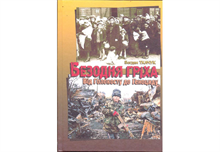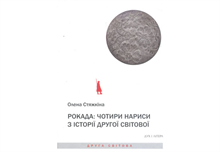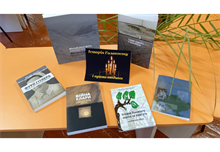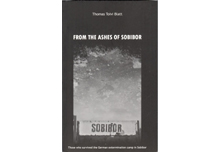Book announcements
-

Bauman Zygmunt. Modernity and the Holocaust / translated from English by Kateryna Dysa. Kyiv: DUKH I LITERA, 2022. 344 p. (in the original Revisiting Modernity and the Holocaust: Heritage, Dilemmas, Extensions)
The book Modernity and the Holocaust by the renowned sociologist and philosopher Zygmunt Bauman occupies a special place among the numerous works on the tragedy of European Jewry.
[More] -

Monolatii I. Ethnoperipherality. Participation of the subjects of the Western Ukrainian ethnopolitical sphere in interethnic interaction, interstate conflicts and culture of memory. Drohobych: Posvit, 2022, 576 p.
In his book, historian Ivan Monolatii highlights the "mnemonic figures" - literary images through which Ukrainian writers of the 1930s-1980s
[More] -

Monolatii, Ivan. Overcome grief. Mnemonic figures of (non)state literature. Ivano-Frankivsk: Lileya-NV, 2020. - 256 p.
In his book, historian Ivan Monolatii highlights the "mnemonic figures" - literary images through which Ukrainian writers of the 1930s-1980s
[More] -

Bohdan Tkachuk. The Abyss of Sin. From the Holocaust to the Genocide. Lviv: Rastr-7, 2022. 116 p.
The book by the well-known journalist and editor Bohdan Tkachuk covers a black page in the tragic history of the Jewish community of Kolomyia during the Second World War.
[More] -

The Operation of the NKVD of the USSR against the Zionists. 1937-1938 / Authors-compilers: Valerii Vasyliev, Roman Podkur, Andrii Kohut. Kyiv: V. Zakharenko Publishing House, 2021. 864 p.
The publication contains documents from the NKVD of the Ukrainian SSR about the mass repressive operation against Zionists that lasted from December 1937 to December 1938.
[More] -

Ethno-political factors of consolidation of the contemporary Ukrainian society / edited by O. Rafalsky (head), V. Voynalovych, M. Riabchuk. Kyiv: I.F. Kuras Institute of Political and Ethnic Studies of the National Academy of Sciences of Ukraine. 2020. p. 336
The book is based on the results from the research on Ethno-political factors of consolidation of the contemporary Ukrainian society carried out by the scholars of the ethno-political department of the I. F. Kuras Institute of Political and Ethnic Studies in 2017-2019.
[More] -

Stiazhkina Olena. Rokada: Four Essays on the History of the Second World War. KYIV: DUKH I LITERA, 2020. - 272 p. (The Second World War series)
The book Rokada: Four Essays on the History of the Second World War discusses the need for a Ukrainian perspective in the history of the war. This includes the formation of a European perspective for analysing events and the return of subjectivity to communities and people who have been appropriated by other people's historical narratives.
[More] -

Book exhibition "The Holocaust History and Human Rights"
Publications of the Ukrainian Center for the Holocaust Study can be seen at the book exhibition "The Holocaust History and Human Rights" in the library of the Erudyt Lyceum in Pervomaisk, Mykolaiv region.
[More] -

Sociopolitical and historical aspects of developing the modern Jewish community in Ukraine: European context
That is the title of monography which was published by the Kuras Institute of Political and Ethnic Studies of the National Academy of Sciences of Ukraine that has been a partner of UCHS for many years. The monography examines the development of Hasidism at the present stage, the historical fate of the Krymchaks, the peculiarities of Babyn Yar complex memorialization, the relationship of Jewish communities of the European Union with state governments, the possibility of borrowing and applying this experience in Ukraine, etc. The author’s team consists of well-known Ukrainian historians and political scientists including scholars from our Centre.
[More] -

Presentation of the UCHS’s publications at the 10th Kyiv Book Arsenal
On 25th June 2021, for the first time in its history, the Ukrainian Center for Holocaust Studies presented its scientific, pedagogical and memorial publications at the 10th Kiev Book Arsenal.
[More] -

A new academic publication on Holocaust history in Ukraine
Before and during the retreat of the Wehrmacht 1943/44 Ukraine became an arena of mass violence. Until spring 1944, Wehrmacht units, police, SS and SD began committing mass killings in different manners. As a part of the guerilla-war concept (Bandenkampf) they burned down villages and killed or deported their residents, stole their food and products.
[More] -

"The Holocaust and city: space of murders – space of destruction"
The first issue of the urban studies journal "City: history, culture, society" has been published. The issue is called "The Holocaust and city: space of murders – space of destruction" and covers the topic of the Holocaust in urban spaces.
[More] -

Jules Schelvis: Inside the Gates , A report of two years in German extermination and concentration camps
Being a Jew, Jules Schelvis, born in Amsterdam in 1921, was captured and deported together with his wife Rachel and her family, via Westerbork to Sobibor. His skills as a printer allowed him to survive with eighteen other people from a total of 34.313 Jews who were deported to Sobibor.
[More] -

Rochelle G. Saidel: The Jewish Women of Ravensbruck Concentration camp
Located about fifty miles north of Berlin, Ravensbruck was the only major Nazi concentration camp for women. During its six years of operation, there was a total of about 20.000 Jewish women in the camp. Drawing upon more than sixty narratives and interviews of survivors in the United States, Israel, and Europe as well as unpublished testimonies, documents, and photographs from private archives, Rochelle Saidel provides a vivid collective and individual portrait of Ravensbruck's Jewish women prisoners.
[More] -

Robert Satloff: Among the Righteous, Lost stories from the Holocaust's long reach into Arab Lands
Robert Satloff tries to enlighten the much neglected topic of Holocaust research in Arab countries. Posing the question "Did any Arabs save any Jews during the Holocaust?" he "set off [..] to find an Arab hero whose story would change the way Arabs view Jews, themselves, and their own history".
[More] -

Jules Schelvis: Sobibor: a history of a Nazi death camp
"Sobibor", written by Holocaust Survivor Jules Schelvis is "a carefully researched and closely argued academic text that has employed the available testimonies and postwar trial documents to produce a comprehensive history of the camp."
[More] -

Thomas Toivi Blatt: From the Ashes of Sobibor.
When Blatt arrived in the Nazi extermination camp of Sobibor he was 15 years old. While all of his family was sent to the gas chamber in front of his eyes, Blatt was chosen for "Arbeitseinsatz" that means assigned to work as a shoe shiner for Karl August Frenzel, commandant at Sobibor.
[More]
Announcements
MoreLatest News
-
UCHS introduces a new section in the social network
The Ukrainian Center for Holocaust Studies is introducing a new section #PhotoHistory (#ІсторіяФото) on its official Facebook page, and the first thing we want to do is share a memory from the Robert Kuwalek Research and Education Seminar held last autumn.
[More] -
International Seminar for Educators in Lublin (Poland)
On 16.06-21.06 2024, the international seminar Unveiling "Aktion Reinhardt": A Multi-Perspective Exploration, at which the Ukrainian Center for Holocaust Studies was represented by Anastasiia Mikheieva and Lesia Yurchyshyn.
[More] -
Research and methodological seminar for educators in Lviv
On 15-16 June, we met with more than twenty participants - mostly teachers from Lviv - to discuss the memory of the Holocaust, other cases of genocide on Ukrainian territory, and the current challenges of working with these topics.
[More] -
History of genocides in Ukraine: studying the experience and challenges of the present. Seminar in Kyiv
On 12-13 June, a research and methodological French-Ukrainian seminar History of genocides in Ukraine: studying the experience and challenges of the present was held in Kyiv. It was organised by the Shoah Memorial (Paris) and the Ukrainian Centre for Holocaust Studies (Kyiv) with the support of the Kuras Institute of Political and Ethnic Studies.
[More] -
Educational Materials “Nazi Genocide against Roma in Ukraine, 1941-1944”
The tragic fate of Roma people during WWII still remains largely unknown in Ukraine and generally in Europe. The new educational materials play an important role in returning Roma history and culture into the history and culture of modern Ukraine, unveiling Roma cultural heritage and the tragic events of WWII genocide against them.
[More]




